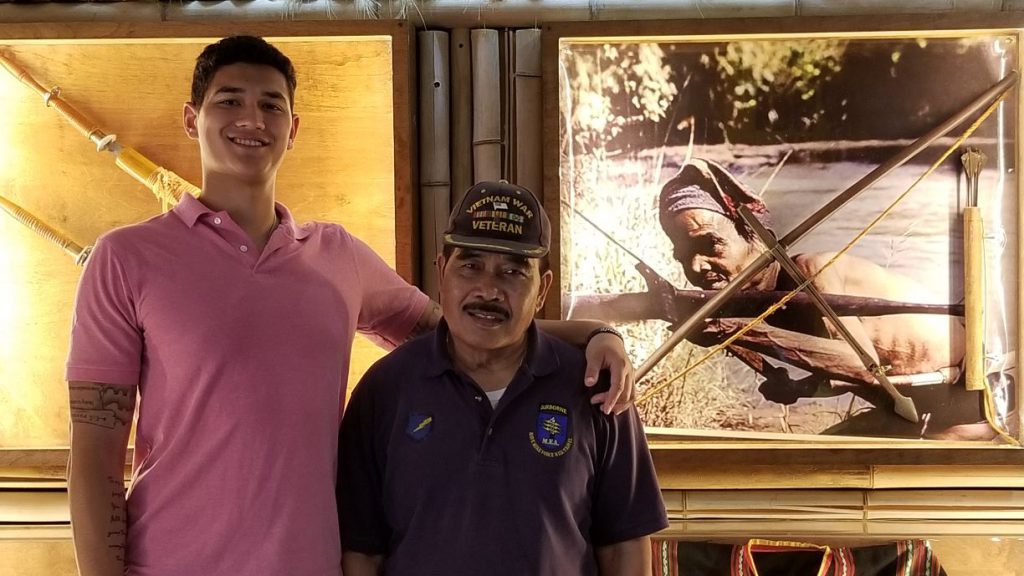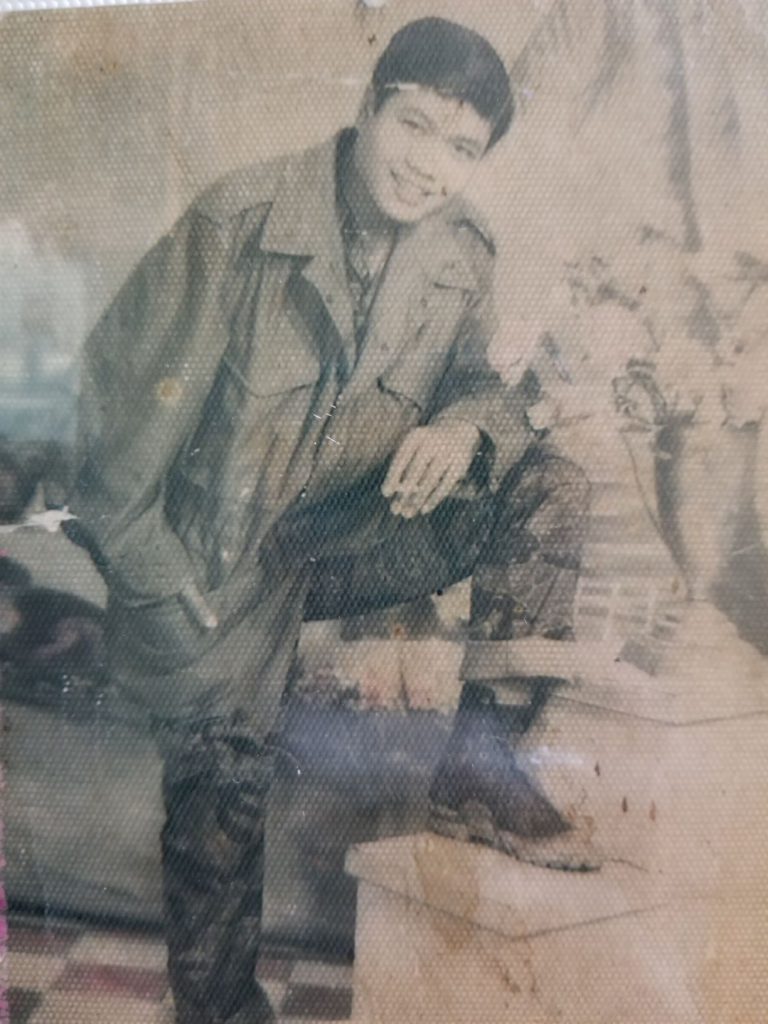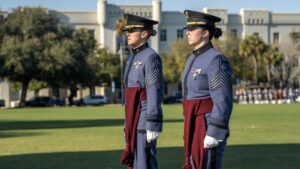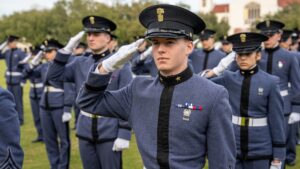
Photo: Citadel graduate Alex Pang-Riddle and his grandfather, K’Sao Krajan, aboard the USS Yorktown
As seen in The Post and Courier, by Jeff Hartsell
The way the story is told in Alex Pang-Riddle’s family, U.S. soldiers were pinned down on a mountain in the central highlands of Vietnam.
His grandfather, a young man named K’Sao Krajan, was a member of the Montagnard tribe indigenous to those highlands. Krajan, like some 61,000 other members of that ethnic minority in Vietnam, had been trained to fight alongside Green Berets against the North Vietnamese and the Viet Cong during the Vietnam War in the 1960s.
Krajan, familiar with the area where the U.S. soldiers were trapped, made his way to a cave that bore through the mountain.
“He crawled through the cave and killed the North Vietnamese soldiers,” Pang-Riddle said. “He actually put on a North Vietnam uniform and cleared the whole cave. And when he got to the top, he waved the soldiers to come through.”

K’Sao Krajan’s acts of valor during the Vietnam War earned him a Bronze Star medal, the highest American award presented to a Montagnard solider. He also was a prisoner of war for four years.
And, some 50 years later, Krajan’s heroism helped his grandson graduate from The Citadel.
When the military school’s Class of 1964 found out that Pang-Riddle, Krajan’s grandson, was enrolled at The Citadel, members of the class decided to sponsor him with a scholarship. Pang-Riddle graduated with the Class of 2019 and plans to return to The Citadel this fall to pursue a master’s degree in exercise science.
“The Class of ’64 as a whole wanted to step up and help out the next generation of cadets,” said retired Army Maj. Edwin Stone, the former co-chairman of the Class of ’64 scholarship. “We established a scholarship meant to help deserving individuals, who did not have the financial resources, get over that bump and attend The Citadel.
“The Class of ’64 doesn’t usually choose who specifically will receive the scholarship. But in this case, the class recommended (Pang-Riddle). Having personally worked with Montagnard soldiers, I don’t believe a recipient could have picked from a more deserving group to honor.”
Pang-Riddle said members of the Class of 1964 learned of his connection to the Montagnard people through a GoFundMe account he had set up, and through a symposium that was held aboard the aircraft carrier Yorktown at Patriots Point in Mount Pleasant in 2015.
“The day before I matriculated at The Citadel, they had a whole display on the boat about our people,” Pang-Riddle said. “And my grandfather got to speak there.”
There, officials discussed the impact of the “secret warriors” who battled alongside U.S. soldiers. There still is a display dedicated to the Montagnard on the Yorktown.
“There is no Special Forces Vietnam veteran who does not owe his life to a Montagnard,” retired Sgt. Major Mike Mika said during the symposium. “I know I do.”
After the war, many of the Montagnard immigrated to the U.S., mostly in North Carolina. Pang-Riddle and his extended family live in Charlotte.
“The Montagnard people were the indigenous people of Vietnam, like the Native Americans in the U.S.,” Pang-Riddle said. “When the Vietnamese people migrated from South China, they came in and started killing off the Montagnard people and taking the land.
“So when the Vietnam War broke out, the Montagnard were very willing to fight for the U.S. against the Vietnamese. Because of what they did in the war, the Montagnard were allowed to come to the U.S.”
Many of the Montagnard settled in North Carolina because of their connection with Special Forces veterans. The U.S. Army Special Forces Command is at Fort Bragg.
“See if you can imagine having people who totally, unconditionally trusted you that you would bring them to victory,” Special Forces veteran George Clark said in a 2002 Associated Press article. “These men were such ferocious fighters, yet such gentle, loving men.”
Today, K’Sao Krajan is 71 and retired with 10 grandchildren. His wife, Nam Pang, also helped the U.S. during the Vietnam War, doing laundry for soldiers on U.S. bases. Pang-Riddle’s father, Son Pang, is a barber, and his mother, Joy Riddle, is in dental-equipment sales.
“I’m very grateful to my grandfather and to the Class of ’64,” Pang-Riddle said. “If not for him and what he did, I would not have received the scholarship to support me through college and to make all the special connections I have made.”

 Prestigious Cincinnati and MacArthur awards presented to Citadel cadets
Prestigious Cincinnati and MacArthur awards presented to Citadel cadets Looking ahead to the major events of 2026-27
Looking ahead to the major events of 2026-27 Photos from campus: January in review
Photos from campus: January in review


